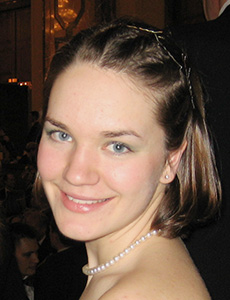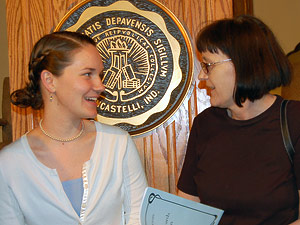Jessica V. Strong '09
May 6, 2009
 Jessica V. Strong '09 had a difficult decision to make as her high school graduation approached. Her interests – playing the piano, psychology and German – were so dissimilar that choosing a college likely meant she'd be leaving one of them behind. Instead, Strong took the easy way out. She came to DePauw and ended up majoring in all three.
Jessica V. Strong '09 had a difficult decision to make as her high school graduation approached. Her interests – playing the piano, psychology and German – were so dissimilar that choosing a college likely meant she'd be leaving one of them behind. Instead, Strong took the easy way out. She came to DePauw and ended up majoring in all three.
"I applied to some universities where it was intimidating to see classes the size of my entire high school," says Strong, a native of Kalamazoo, Mich. "I really wanted to have small classes so that I had some interaction with professors. I also looked at some conservatories, which are very performance oriented, but I knew that I wanted to take psychology classes and to continue to study German. DePauw allowed me to take piano lessons in the School of Music, and I also had the opportunity to get a liberal arts education as well."
Even on a campus where double majoring is somewhat of a pastime, rarely are the limits of academic dedication pushed any further than by Strong. She entered the B.A./B.M. program offered by the College of Liberal Arts (CLA) and School of Music thinking that she'd leave DePauw with dual degrees in music performance and psychology. But last fall, Associate Professor of Modern Languages Inge E. Aures told her that, because Strong had steadily chipped away at her language coursework, she was only one class away from completing a major in German as well. Strong had to petition the registrar's office to recognize a third major. "They had to create a new transcript because it doesn't happen very often," she recalls.
And for good reason. Although the B.A./B.M. degree program gives students an extra year to complete their studies, the demands of the School of Music alone were difficult to reconcile with her psychology degree work, a fact echoed by a disclaimer in the School of Music's student handbook:
CLA majors that may not be possible or may be challenging to complete in the five-year double degree program include, but are not limited to, Art History, Kinesiology, Biochemistry, Biology, Mathematics, Physics, Psychology, Studio Art, and English (Writing).
"The opportunity to [pursue a triple major] has been amazing, but the work can be overwhelming," Strong says. "I practice the piano three or four hours a day, not including the hours spent as part of an ensemble, and that's on top of my other classes. ... I don't think it would have been possible to get through this degree program without the help of my professors and my advisers."
As DePauw's commencement draws near, Strong might have once again been faced with choosing among her interests if not for the continued advice of Aures, who also serves as the University's adviser for the German Academic Exchange Service (Deutscher Akademischer Austausch Dienst, or DAAD). At Aures' urging, Strong submitted a project proposal for a 10-month DAAD Study Scholarship that combines both music and psychology: the effects of music therapy on dementia.
"I thought for a while that the only way that I could put music and psychology together is music therapy," Strong says. "My research project looks at effect of background music on symptoms of dementia and depression. I've done a literature review for a few years, but there still isn't a lot of research on the effects.  The research that does exist suggests that music can increase the amount of positive symptoms in patients – they interact more, they make eye contact and are more engaged in their environment – while also decreasing the negative symptoms of dementia, such as aggression."
The research that does exist suggests that music can increase the amount of positive symptoms in patients – they interact more, they make eye contact and are more engaged in their environment – while also decreasing the negative symptoms of dementia, such as aggression."
Strong's proposal was accepted by DAAD, and pending a funding decision, she will likely split her time in Germany between research at the Central Institute of Mental Health and continued studies at the University of Mannheim.
"Jessica is an exceptional student," says Aures (right, with Strong). "I am very proud, but not surprised that she was awarded the scholarship. She presented an interesting proposal and had already developed contracts with researchers in Germany, which certainly strengthened her case."
The DAAD Study Scholarship is open to students in all academic fields. While science students are not required to be proficient in German, students from the arts, humanities and social sciences should have a good command of the language. For more information, visit the DAAD Web site or contact Inge Aures.
Back